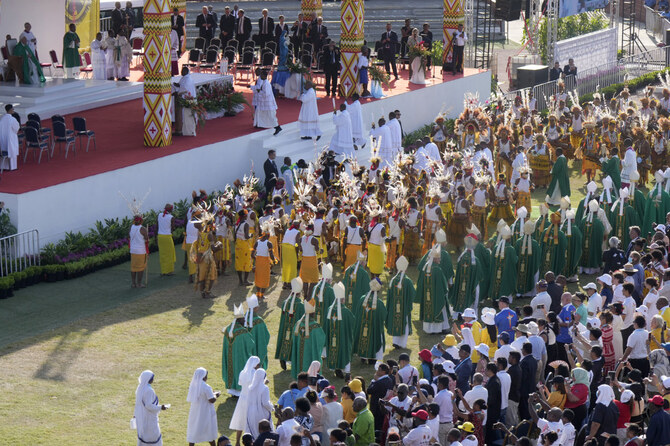PORT MORESBY, Papua New Guinea: Pope Francis honored the Catholic Church of the peripheries on Sunday as he celebrated Mass in Papua New Guinea before heading to a remote part of the South Pacific nation with a ton of humanitarian aid to deliver to the missionaries and faithful who live there.
An estimated 35,000 people filled the stadium in the capital Port Moresby for the morning Mass. It began with dancers in grass skirts and feathered headdresses performing to traditional drum beats as priests in green vestments processed up onto the altar.
In his homily, Francis told the crowd that they may well feel themselves distant from both their faith and the institutional church, but that God was near to them.
“You who live on this large island in the Pacific Ocean may sometimes have thought of yourselves as a far away and distant land, situated at the edge of the world,” Francis said. “Yet … today the Lord wants to draw near to you, to break down distances, to let you know that you are at the center of his heart and that each one of you is important to him.”
Francis was himself traveling to a distant land on Sunday, flying into remote Vanimo, on Papua New Guinea’s northwest coast, to meet with the small Catholic community there served by missionaries from his native Argentina.
Francis was being transported by an Australian military aircraft and was bringing with him one ton of humanitarian aid, including medicine, clothes and toys for children, according to Vatican spokesman Matteo Bruni.
Eight suitcases of medicine and other necessities had been prepared by one of the Argentine missionaries, the Rev. Alejandro Diaz, during a recent trip to Rome and left with the Vatican to bring in on the cargo plane, the ANSA news agency reported.
Francis has long prioritized the church on the “peripheries,” saying it is actually more important than the center of the institutional church. In keeping with that philosophy, Francis has largely shunned foreign trips to European capitals, preferring instead far-flung communities where Catholics are often a minority.
Vanimo, population 11,000, certainly fits the bill. Located near Papua New Guinea’s border with Indonesia, the coastal city is perhaps best known as a surfing destination.
Francis, history’s first Latin American pope, has also had a special affinity for the work of Catholic missionaries. As a young Argentine Jesuit, he had hoped to serve as a missionary in Japan, but was prevented from going because of his poor health.
Now as pope, he has often held up missionaries as models for the church, especially those who have sacrificed to bring the faith to far-away places.
There are about 2.5 million Catholics in Papua New Guinea, according to Vatican statistics, out of a population in the Commonwealth nation believed to be around 10 million. The Catholics practice the faith along with traditional Indigenous beliefs, including animizm and sorcery.
On Saturday, Francis heard first-hand about how women are often falsely accused of witchcraft, then shunned by their families. In remarks to priests, bishops and nuns, Francis urged the church leaders in Papua New Guinea to be particularly close to these people on the margins who had been wounded by “prejudice and superstition.”
“I think too of the marginalized and wounded, both morally and physically, by prejudice and superstition sometimes to the point of having to risk their lives,” Francis said. He urged the church to be particularly close to such people on the peripheries, with “closeness, compassion and tenderness.”
Francis’ visit to Vanimo was the highlight of his visit to Papua New Guinea, the second leg of his four-nation tour of Southeast Asia and Oceania. After first stopping in Indonesia, Francis heads on Monday to East Timor and then wraps up his visit in Singapore later in the week.


Pope to bring in a ton of humanitarian aid to remote Papua New Guinea as he celebrates periphery
Short Url
https://arab.news/y6m6v
Pope to bring in a ton of humanitarian aid to remote Papua New Guinea as he celebrates periphery

- n estimated 35,000 people filled the stadium in the capital Port Moresby for the morning Mass
- On Saturday, Francis heard first-hand about how women are often falsely accused of witchcraft, then shunned by their families
- He urged the church leaders to be particularly close to these people on the margins who had been wounded by “prejudice and superstition”
Hegseth tells Israel to press on ‘until the end’, Israeli defense ministry says

TEL AVIV: US Secretary of Defense Pete Hegseth told Israel to “keep going until the end,” saying the US stood with Israel, in overnight talks with Defense Minister Israel Katz, Israel’s defense ministry said on Thursday.
Katz thanked Hegseth for extensive US assistance in defending Israeli citizens against the Iranian missile threat, it said.
Katz thanked Hegseth for extensive US assistance in defending Israeli citizens against the Iranian missile threat, it said.
© 2026 SAUDI RESEARCH & PUBLISHING COMPANY, All Rights Reserved And subject to Terms of Use Agreement.












